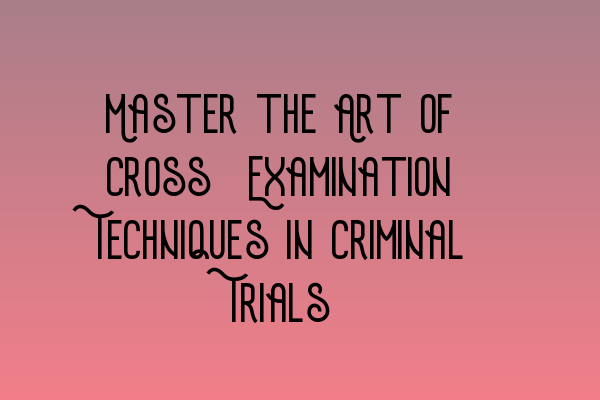Master the Art of Cross-Examination Techniques in Criminal Trials
As a criminal law practitioner, mastering the art of cross-examination is crucial for success in the courtroom. Cross-examination is a powerful tool that allows you to test the credibility of witnesses, challenge their version of events, and uncover the truth. In this article, we will explore effective cross-examination techniques that you can use to bolster your advocacy skills and achieve favorable outcomes for your clients.
The Importance of Preparation
Before delving into the techniques themselves, it is imperative to emphasize the significance of thorough preparation. To conduct a successful cross-examination, you must be meticulously prepared with a deep understanding of the case, the witness’s testimony, and the relevant legal principles. Inadequate preparation can weaken your credibility and hinder your ability to effectively challenge the witness’s account.
When preparing for cross-examination, it is essential to gather as much information as possible about the witness. Research their background, review their previous statements, and identify any inconsistencies or biases that may be exploited during the examination. This preparation will enable you to formulate strategic lines of questioning and anticipate potential responses.
Techniques for Effective Cross-Examination
1. Leading Questions: SQE 1 Preparation Courses
Leading questions are an effective tool to control the witness’s testimony and elicit desired responses. By phrasing questions in a way that suggests the answer, you can guide the witness towards supporting your client’s case. However, be cautious not to ask leading questions that may be objected to as leading or argumentative.
2. Impeachment: SQE 1 Practice Exam Questions
Impeachment involves challenging the witness’s credibility through contradictory evidence or prior inconsistent statements. By presenting evidence that contradicts the witness’s testimony, you can undermine their reliability and cast doubt on their version of events. Use this technique strategically to weaken the prosecution’s case and bolster your defense.
3. Control the Narrative: SQE 1 Practice Mocks FLK1 FLK2
During cross-examination, you have the opportunity to reshape the narrative in favor of your client. By asking open-ended questions, you can prompt the witness to provide additional details or clarify inconsistencies in their testimony. This technique allows you to present alternative theories or interpretations that align with your defense strategy.
4. Verbal Jiu-Jitsu: SQE 2 Preparation Courses
Verbal jiu-jitsu involves using the witness’s own statements against them. When you identify inconsistencies or contradictions in the witness’s testimony, point them out and ask clarifying questions that expose the flaws in their account. This technique can be particularly powerful in discrediting key prosecution witnesses and creating reasonable doubt in the minds of the jury.
Adapting to the Witness
One of the keys to successful cross-examination is adaptability. Every witness is unique, and their demeanor, personality, and level of cooperation can influence the approach you take. Pay close attention to the witness’s body language, tone, and hesitations during their testimony. These cues can guide your questioning strategy and help you uncover hidden inconsistencies or signs of deception.
Remember to remain respectful and professional throughout the cross-examination process. While it is important to be assertive and persistent in challenging the witness’s testimony, crossing the line into aggression or intimidation can backfire and damage your credibility.
Conclusion
Mastering the art of cross-examination is an essential skill for criminal law practitioners. By thoroughly preparing, employing effective techniques, and adapting to the witness, you can maximize your chances of achieving favorable outcomes for your clients. Keep honing your advocacy skills and stay updated on the latest legal developments to excel in the courtroom.
For more information on preparing for the SQE exams or to check the exam dates, visit SRA SQE Exam Dates.
